15 historic and prolific farming families of the Wide Bay Burnett
From fifth generation farms to international suppliers, the stories behind the Wide Bay and Burnett’s most prominent farming families involve wars, empires made and lost, industries that grew and died, love and legacy. Here are their true blue stories.

Bundaberg
Don't miss out on the headlines from Bundaberg. Followed categories will be added to My News.
It’s no secret the Wide Bay Burnett is a key part of the state’s food bowl, home to some of the largest suppliers of beef, sugarcane, small crops and sweet potatoes in Queensland.
‘Nothing else matters’: Meet some of Qld’s best young farmers
The lifeblood of these farms are the families who have - in many instances - poured decades of their blood, sweat and tears into keeping the land alive and productive.
The effort has produced spectacular results with the agricultural, forestry and fishing output across the Wide Bay Burnett totalling $1.76bn in 2020-21, figures from the National Institute of Economic and Industry Research show.
Agricultural industries contributed to more than $1.5bn of this.
Primary industries accounting for about 22 per cent of the region’s economy, compared to the state average of 6.3 per cent.
Bundaberg businesswoman to chair ‘vital’ horticulture council
From multi-generational farms to successful new enterprises, meet some of the prominent farming families keeping the nation fed and clothed.
Greenup Family, Eidsvold
Rick and Alice Greenup are the owner operators of one of the most prominent cattle stations in South East Queensland - Eidsvold Station.
The station was first settled in 1848 by Norwegian explorer Thomas Archer, rumoured to be the first white man to set foot on the Burnett River.
In 2006, the Greenups took over the property with a lease-to-buy arrangement for the 1500-strong female stud herd and 300 commercial cows.
By 2016, they had purchased the 25,000ha of land holdings which comprised the Eidsvold Station aggregate, cementing themselves as one of the nation’s largest Classified Santa Gertrudis herds.
Their annual bull sale is one of the highlights of the Burnett’s agricultural calendar, where hundreds of guests and prospective buyers attend to pursue more than 100 stud bulls.
At their 2022 sale, Alice and Rick offered 132 bulls for purchase averaging an auction price of more than $15,000.
The pair stand behind their simple and effective philosophy.
“To breed profitable cattle for self-replacing commercial herds, which perform in all environments and within all major markets.”
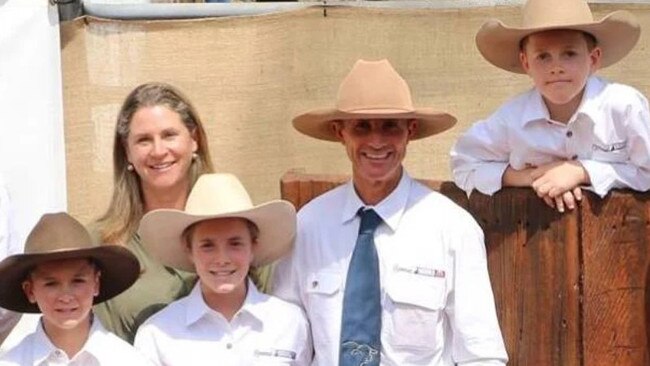
Kirk Family, Gayndah
The Kirk family have a long and storied history with cattle breeding in the Gayndah area.
They are the owner operators of the Hazelton Brahman Stud, first registered in 1961 by Ted Kirk and his wife Grace.
The pair had been breeding Hereford cattle when Ted Kirk recognised the advantages Brahman cattle had when it came to drought and tick resistance.
The decision to interbreed these lines defined the Hazelton line which remains in the Kirk family name under Ted Kirk’s son Brett Kirk and his own children Stuart, Logan, Frazer and Lucie- Anne.
The family‘s stud line offers more than 30 bulls annually for purchase through the Rockhampton Brahman Week Sales, and they have even exported cattle to multiple Indo-Pacific countries, including Papua New Guinea and Indonesia.
Brett Kirk said when it came to the family’s legacy is was all about the work ethic that had been instilled since childhood.
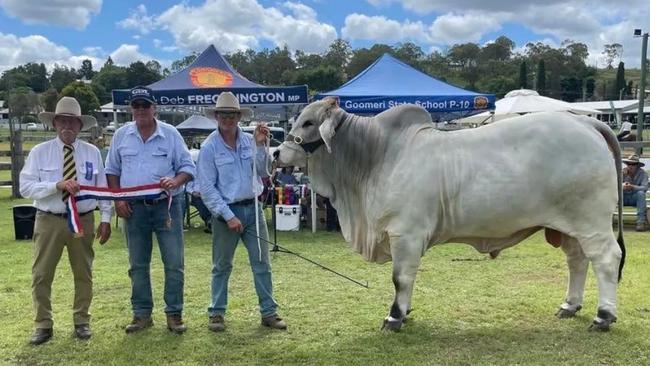
Wason family, Kilkivan
The Wason family have been stalwarts of Kilkivan since they first settled on the Mudloo family property in 1878.
Originating from the West Indies, James Wason established the family farm and began by timber harvesting and running dairy cattle.
Over the years the property was host to a range of community facilities, including a school.
The area was also rich with copper and had many visitors hoping to fossick and mine for the mineral.
Today the property remains in the hands of matriarch Teresa Day who manages the property with her husband Ben and their two sons Isaac and Luke.
Mrs Day manages the property alongside her parents Rhonda and Russel Wason.
As times changed, the family transitioned into cattle, and the 1800ha property now focuses on managing their Mortar and Droughtmaster cattle.
“In the early years like many in the district we had a Hereford based herd, however now with the influence of ticks and flies on cattle in the area we have switched to a more resilient tropical herd of predominantly Droughtmasters,” Mrs Day said.
Though Isaac and Luke are still in their teenage years, their passion for the land and the agricultural industry means they are likely to continue their families farming legacy for years to come.
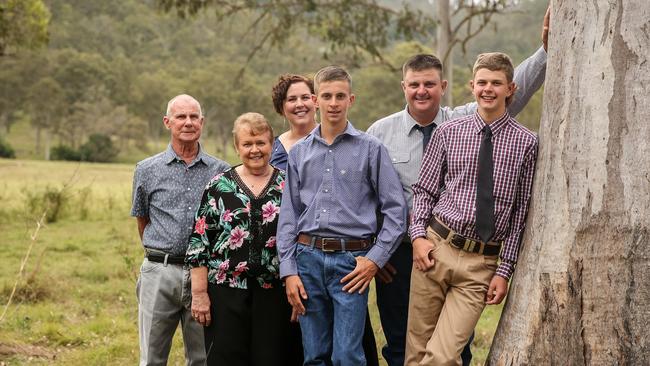
Duff family, South Burnett
Since Patrick Duff first immigrated to Australia in 1863 from Ireland, the Duff family have become staples of the South Burnett.
After settling at the Di Di property in 1921, the Duff family have remained consistent in their farming vision.
Though they celebrated their 100th family anniversary at the Di Di farm in 2021, the only key farming change the family has made is selectively breeding their Hereford cattle to become polled.
They have also consistently sold commercial timber and credit their dedication to the land for their continued success.
“Our family have over the years successfully run Hereford cattle in a changing environment, we have looked after our timber and continue to have sustainable timber production,” Kathy Duff said.
Mrs Duff also credited her family’s dedication to heritage farming practices for their continued love of horses.
“We have loved, lived and breathed for our horses,” she said.
“We still use horses for mustering, we have competed in pony club, shows, campdrafts and racing over those hundred years and still have a strong interest in thoroughbred racing, particularly with horses still carrying the original Duff jockey colours of emerald green with an addition of a pink maltese cross.”
Mrs Duff owns and manages the family property alongside her brother Michael Duff who feels their family legacy can be summed up in the four simple words of the family motto: “Without God, without anything.”
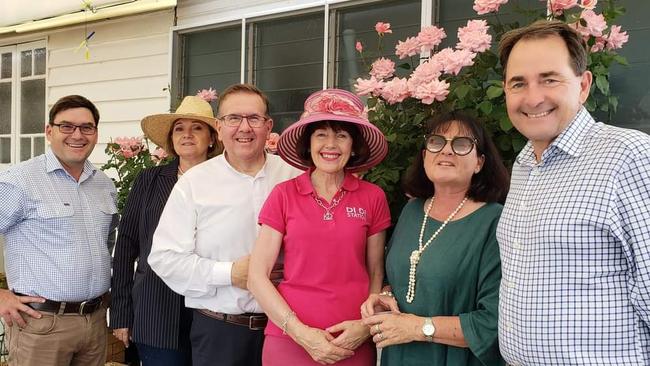
Atthow family, Millmerran, Kilkivan

The Atthow family settled at “Karandah” Kilkivan in 1952, when Ralph Atthow and his wife Valera moved from the Mary Valley district.
Ralph being the son of Reg from the Brisbane Valley. Ralph and Valera raised their family at “Karandah” and it was passed on to their son Mike and his wife Mary Ann.
Then came the next generations Ian Atthow, his wife Donna and three sons, Jack, Dan and Hugh.
Ian and family moved away from “Karandah” to a Millmerran property, while his mother, Mary Ann and sister, Holly Dawson are still settled on the family property.
Up until 2015, the family owned 15000 acres at Kilkivan, but after selling a portion of their property between 2015 and 2016, the Kilkivan country currently sits at 3500 acres.
Since the early 1900’s the Atthow family have been beef cattle producers across Queensland and are continuing to do so on both their Kilkivan and Millmerran property.
In recent times the biggest change in the industry is the marketing of younger cattle, with feedlots becoming more efficient over grass fattening, allowing producers to sell their cattle earlier.
“Because the cattle are younger, meat quality is generally more tender” said Mr Atthow
While Ian and Donna hope to leave a legacy with their children, after working on a cattle station in the Northern Territory and at home.
Currently Jack, 21 is working at a local mine while Dan, 18 has just completed school and is taking a year working over in Western Australia on a cattle station.
Youngest son Hugh is still at boarding school.
“We can’t say for sure that they will choose the same path as we have but at this point the Atthow Family will still continue on in the beef Industry with their Kilkivan & Millmerran properties,” the family said.
Passchendaele Farm, South Burnett
The story behind Passchendaele farms has been a heartbreaking and wholesome part of the Australian war legacy.
The 2023ha of cattle grazing land turned farmstay has become an icon in the region, and is operated by Ken and Carolyn Stone.
The land was purchased by Mr Stone’s grandfather, Arthur Mervyn Bassingthwaighte upon his return from World War I and has remained in family hands since 1921.
Upon his return from Europe where he was badly gassed, Mr Bassingthwaighte purchased the land as part of a soldier settlement scheme.
“When he came home he selected the block of dirt and named it Passchendaele after his fallen mates,” Mr Stone said.
The Battle of Passchendaele, Belgium was one of the most notorious and bloody battles of WWI, and more than 38,000 Australians became casualties of it.
The family have continued the legacy of Mr Bassingthwaighte through their classic and historic farm stay.
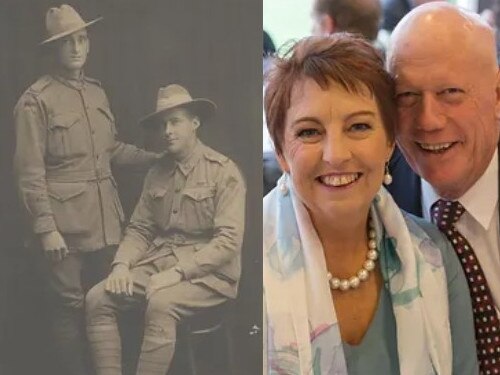
Christensen Family, Booyal
After immigrating from New Zealand in the early 20th century, Mary and Charles Christensen began one of the most successful farming families in the Burnett.
Initially settling in Bundaberg, the pair moved to Booyal in the early 1920s to marry, and built their family home Booyal House.
The hundred-plus year old home remains in the family today, under the stewardship of Charles’s grandson Reginald – fondly known as Reggie or Reg – and his wife Elva.
The home has been host to a century of memories, including the marriage of Mary and Charles’s daughter Charlotte in the late 1930s.
Charlotte was one of seven children Mary and Charles would have, along with siblings Christine, Mark, Steve, Gordon, Wally and Noel.
Wally, Reg’s father, would have seven children of his own, and Reg found himself with siblings June, Christine, Jim, Greg, Stewart and Barry.
The family has built an impressive legacy of success, from Reg and Elva’s running of more than 400ha of cattle grazing land alongside a successful fencing contracting business.
June runs a successful childminding service, Christine operates an emerald mine and a prosperous greyhound racing business.
Jim has retired after decades of investing superannuation on behalf of the Queensland government, Stuart operates his own butchery and quarry.
Barry owns and operates more than 24,000ha of cattle grazing land and runs his own transport company.
Speaking on the legacy of the family, Reg’s cousin Graham Christensen recounted the toughness of his family bloodline through a tale which he said best represented the patriarch of the family; his grandfather Charles.
“He was working down at Goomeri in the late 1930s and he was cutting timber on his own,” he said.
“They used to have the timber piled up so if you knocked a chock out from under the pile they would all roll into the gully below to be picked up later.”
“Somewhere along the line, the pile crashed onto Charles’s leg and foot and he was trapped, he was on his own,” Mr Christensen said.
“He was just able to reach an axe, he couldn’t get the logs off so he cut his foot off with the axe, tied it up and crawled on his hands and knees for kilometres until a bullock wagon picked him up.”
Charles would go onto to ride and continue working hard well until his 70s and this determined working ethic would come to define the legacy of the hardworking family.

Anderson Family, Childers
As the sole remaining farmer of four generations of Childers farming, Peter Anderson has brought an undeniable passion to the industry.
His great grandfather John William Anderson began the farming legacy after moving from England in 1887, settling in Childers to join one of many cane growers in the region.
Over the generations the family farms grew and shrank until Peter and his wife Janet took over the 80ha of land still remaining in the family in 2018.
After taking over the land they made the leap from cane to macadamias, a move which excited and enticed Peter for years.
The pair spent the first few years of the transition setting up the property, and Mr Anderson said his family knowledge of the land was instrumental in building the initial crop.
The shift cemented their eventual decision to leave their beloved post as the stewards of the Childers Post Office in 2022, a job in which they served the community for almost three decades.
“It is a vital community network, and I really enjoyed working there because I got to know everyone,” Mr Anderson said.
The impact of Covid shut the post office, and Mr Anderson said the farm served as a unique way to keep his team employed.
“We had this staff we didn’t want to lose, who had nothing to do,” he said.
“So we went around the macadamia crop, picking nuts off the ground, we didn’t make any money but it was a nice buzz.”
Since planting their first crop the pair have gone from a 750kg return to a 44 tonne return, with expectations of harvesting more than 80 tonnes this year.
“We’re very happy that we have continued the legacy of the farm,” Mr Anderson said.

Rehbein family, Bundaberg
The Rehbein family farming legacy began in the late 1800s when three Rehbein brothers immigrated to the Bundaberg region from Germany.
That farming bloodline continues today in great grandson Anthony Rehbein and his daughters Lily and Charlotte Rehbein.
Anthony is a familiar face in the region as the owner and operator of One Little Farm, a boutique produce store in East Bundaberg.
The family began farming in the traditional crop of the region, sugar cane, but Anthony and his father Robert had concerns over the industry’s future and began to diversify into small crops in the 1980s.
The move culminated in the opening of the shop One Little Farm, which has become the legacy of the family and an opportunity for them to step away from the “price-taker” mentality farmers are often saddled with.
“Our family and their heritage meant we really didn’t like being just another number in the system, and not important to the supply chain,” Anthony said.
The shop also serves as a sustainable way to offer a lasting legacy to Anthony’s daughters, who both have a keen passion for agriculture, food and quality produce.
“It’s an integral part of our farming legacy because it is who we are,” he said.
“We stand behind the growers who grow for us, I’m proud of the local farmers and it’s important to highlight that the farmers are the heroes who are forgotten in the supply chain.”
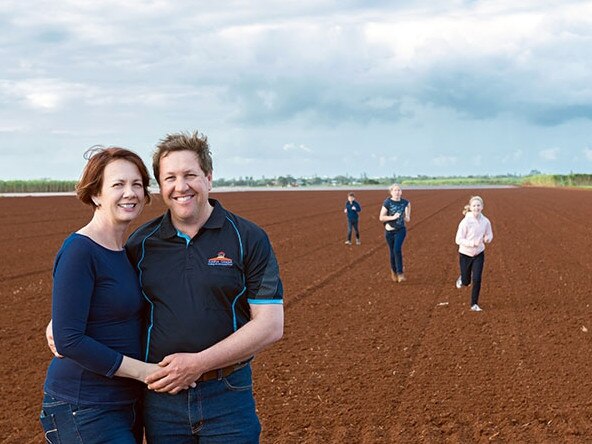
Webb family, Widgee
The Webb family have become synonymous with all things country as the founders and original hosts of the popular Gympie Music Muster, held for the first three years at their family property Thornside, at Widgee, west of Gympie.
The property was established by George Slater Webb in 1882, two decades after he immigrated from Ireland when an aspirational medical career was cut short by a hand injury.
He originally settled in the Cooroy-Gympie area in the 1860s, starting a carrying business using a six horse team to cart timber to Tiaro where it was loaded onto barges and sent to Maryborough.
Grandson Berard Webb spoke highly of the legacy his grandfather built, saying he came to Australia with no hands-on cattle experience but by the 1880s would become the largest landholder in the Wide Bay Burnett alongside his sons.
G.S. Webb would relocate to the Blacksnake gold mining area, near Kilkivan in 1872.
With a “keen eye for a deal” G.S. Webb would go on to become the custodian of more than 300 miners during the Gympie gold rush, and would also open a successful store, butcher shop, hotel and post office.
This was all done while managing his own cattle herds and fighting natural disasters of the time.
The 3500ha of land of Thornside G.S.Webb accumulated was passed along through his children Georgina, Maria, Thomas, Henrietta, William, Edward and Henry and subsequently in the next generation, to Fabian, Marius and Berard Webb.
Thornside was the original home of the Gympie Music Muster, first known as the Webb Brothers Country Music Muster.
The event was founded to commemorate the family’s 100th anniversary of ownership at Thornside, and 25 years of successful country music making by the popular band the Webb Brothers’ (Berard, Fabian and Marius Webb).
Berard Webb, one of the brothers of the music troupe, recalls the overwhelming response the family had to their first “muster” which more than 6000 people attended in 1982.
In 2023, the event, now located in the Amamoor State Forest has grown to become one of the most enjoyable on the Queensland social country calendar, cementing the lasting legacy of G.S. Webb for years to come.
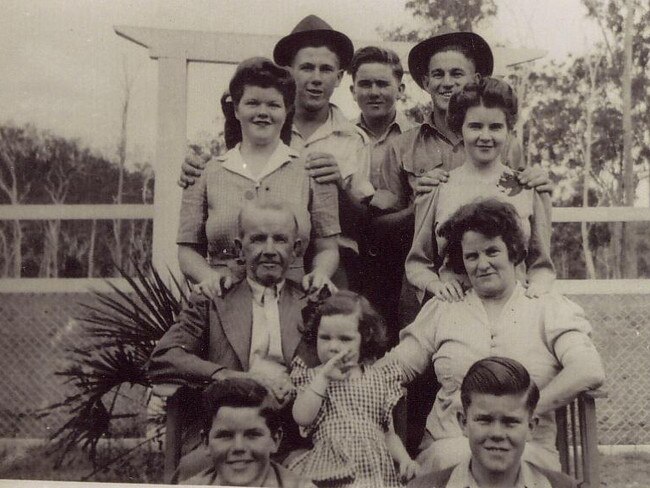
Fitzgerald family, Woolooga
The Fitzgeralds are one of the many farming families on this list who trace their Australian farming heritage back more than 100 years.
John Fitzgerald immigrated from Ireland in 1859, before settling on land known as Boowoogum or Place of Owls in 1874.
Since then the family has continued the farming legacy through the generations, and in the 1970 established the Fitzgerald and Company partnership.
The family owns 1200ha and leases 1000ha more to run their droughtmaster cattle.
They were not always droughtmaster people, and began in the 1870s with shorthorn beef cattle.
By the early 1900s they had transitioned to hereford cattle, along with operating two dairies and two piggeries.
When Great Britain joined the EU in the 1970s the flow-on effect brought on the closure of the dairies and the piggeries, and the family transitioned to santa gertrudis cattle.
Today the family focuses on battling ongoing environmental issues from droughts to floods alongside vegetation, feral animals and general maintenance requirements to sustain their 440 breeder mob.
The family have said they are committed to continuing their family’s farming legacy, and coupled with a love of the land and a desire to supply quality cattle for the market have established an impressive family-run business.

Dingle family, Burnett
It is impossible to call yourself a Burnett local and not know a member of the Dingle family.
From world-class woodchoppers to local council members, the Dingle family is synonymous with agriculture in the Burnett.
After initially settling in Mount Perry more than four generations ago, the Dingle name has spread to become one of the most respected and influential in the region.
A family with an expansive family tree, the Dingles command more than 40,000ha of land from Mount Perry to past Mundubbera.
Lindsey Dingle, a fourth generation grazier in the Mount Perry region, spoke on the legacy and heritage in the family name.
“The passion for agriculture is instilled in you, you’re brought up in a family that loves the land and loves the animals, you’re always going to take it on,” he said.
As the next generation prepares to take on the mantle of carrying the Dingle name, Mr Dingle is looking to his children to continue the legacy.
Of his four children; Brooke, Jessie, Kurt and Clint two have stepped forward to continue working with cattle and the land.
“As parents we put the tools for the industry for the kids and let them grow up with that,” Mr Dingle said.
“We really do pay respect to the older generations for instilling that respect for the land in us, we’re always going to follow in their footsteps and enjoy the land as they did.”
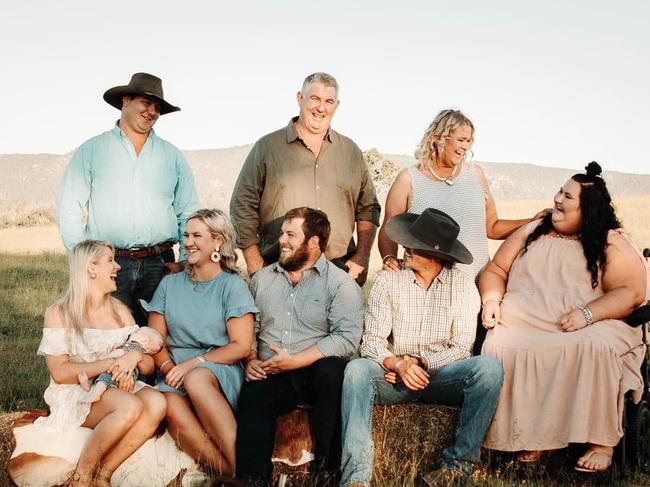
Strathdee family, Bundaberg
The Strathdee family is one of the oldest in the Bundaberg region, having settled at the Maudsleigh Estate in 1879, 50 years after the first of the Strathdee family travelled from homeland Scotland to Australia.
Brothers Robert and William Strathdee landed in Sydney on September 30, 1839 where they lived before travelling to Bathurst a few years later.
By 1848, they had made their way to Cooranga Station, near Gayndah, settling on a holding of more than 180,000ha.
At its peak in 1865, Robert Strathdee oversaw 200,000 sheep, 5000 cattle and 200 horses before natural disasters took their toll and the land was handed to the Scottish Australian Investment Society.
In 1879, Robert purchased much of the land that would become Maudsleigh Estate, and over the years the land and the name Robert was passed down through the generations.
In 2022, the Strathdee family mourned the passing of Robert Keith Strathdee, the third generation Robert Strathdee who had managed Maudsleigh Estate his entire life.
Robert Keith Strathdee was known throughout the region for his determined advocacy for the aged community, services which resulted in him awarded with an OAM in 1999.
A proud member of the Bundaberg Show Society, Bundaberg Pony Club and Vintage Car Club for many years, Robert encouraged his four children to become active members of their community.
His eldest son Robert, would carry his name and the family legacy when he purchased his own cane property north of Bundaberg in the 1980s.
Karen Strathdee would become Karen Cribb after her marriage to the Charlie Cribb, another well known Bundaberg family.
Malcolm Strathdee would step away from the family farm, to run a successful business of his own.
Dave Strathdee, Robert’s youngest son would take over the mantle at Maudsleigh and continues to farm cane and cattle with the support of his children Nicole and Kristopher.

Zunker family, Bundaberg
The Zunker family is known for being one of the most successful farming families in the Wide Bay Burnett.
August and Appolinia Zunker first arrived in Australia from Prussia in 1872, initially settling outside of Maryborough and working at the Yengarie Sugar Mill while raising seven children.
In 1896 the family moved to Burnett Heads in Bundaberg settling on Homebrush, a property which would remain in the family name until the 1970s.
“August Zunker’s family were for many years the most successful farmers in the district, and it is probably with much pride he farmed and made the Zunker name what it is today,” said Lynda Zunker.
As the years moved on, the family would diversify from cane into small crops and the family can still be found small crop farming in the Woongarra area of Bundaberg.
Much of the large Zunker family continues the farming legacy built by August Zunker in the 1800s.
The family has been the driving force behind some of the most successful farming enterprises in the region including the Steinhardt macadamia empire.
The legacy of the family can be seen in their motto “work hard, persevere and you can achieve anything”.
“The Zunker name will long be remembered as one of the pioneering cane farming families in of the Bundaberg area,” Mrs Zunker said.
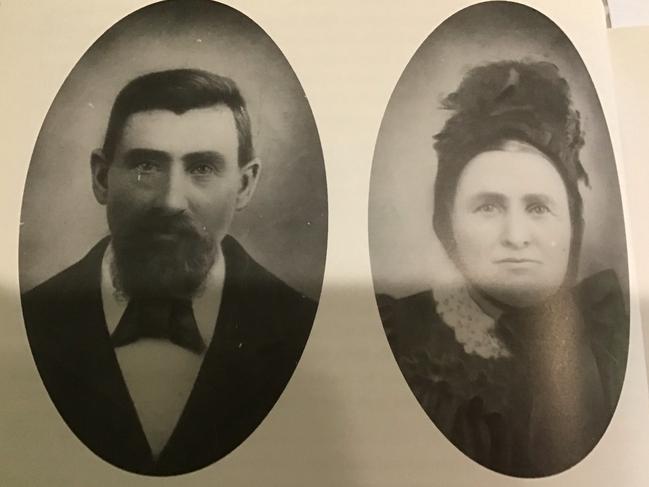
Day family, Theebine
The Day family have been stalwarts of the Theebine, Kanyan area since Fredrick Day first settled there in 1908.
The 325.5ha property, fondly known as Day Dawn, has remained in the family since that date and is now home to the fifth generation of the Day family.
The property first hosted the string of cattle Mr Day brought from Samson Vale, before he made the progressive decision to install one of the first milking machines in the state.
The family would continue in the dairy industry until deregulation in the 1970s greatly impacted it and they were forced to return to running beef cattle.
In 1966 Fredrick’s grandson Bevan Day bought out the farm from his parents, and continues to work it to this day.
“It’s pretty special to the family, we’ve been here all these years.” he said.
He hoped to pass the land along to his own children though is aware of the pressures of rising costs are forcing many farming families out of the industry.
“I’d just like my family to continue on as long as they can,” he said.
The family is preparing for a reunion this month, where they expect more than a hundreds family members and visitors to arrive.
Bevan’s twin brother Kevin Day prepared a poem for the exciting occasion, and the following is a short snippet.
“An invitation to one and all, so we can reunite and have a ball,” he said.
“Come for a day, or two or maybe three to this special farm to be happy and free.”
More Coverage





